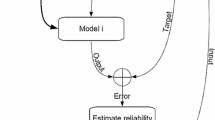Abstract
This paper presents a new algorithm to construct a neural network ensemble (NNE) based on heterogeneous component neural networks with negative correlation learning. The constructive algorithm consists of two parts: a sub-algorithm to construct best heterogeneous component neural networks with negative correlation learning dynamically (CBHNN), and a sub-algorithm to construct heterogeneous NNE with trained heterogeneous neural networks incrementally (CHNNE). The experiment results showe that HNNE is better than the traditional homological NNE method.
Preview
Unable to display preview. Download preview PDF.
Similar content being viewed by others
References
Krogh, A., Vedelsby, J.: Neural network ensembles, cross validation, and active learning. Advance in Neural Information Processing Systems 7, 231–238 (1995)
Optic, D.W., Shavlik, J.W.: Generating Accurate and Diverse Members of a Neural Network Ensemble. Advance in Neural Information Processing System 8, 535–543 (1996)
Rosen, B.E.: Ensemble learning using decorrelated neural networks. Connection Science 8, 353–373 (1996)
Liu, Y., Yao, X., et al.: Evolutionary ensembles with negative correlation learning. IEEE Transactions on Evolutionary Computation 4, 295–304 (2000)
Zhou, Z.H., Wu, J.X., et al.: Ensemble neural networks: Many could be better than all. Artificial Intelligence 137, 239–263 (2002)
Bakker, B., Heskes, T.: Clustering ensembles of neural network model. Neural Networks 16, 261–269 (2003)
Fahlman, S.E., Lebiere, C.: The Cascade-Correlation Learning Architecture. Advances in Neural Information Processing Systems 2, 524–532 (1990)
Hoehfeld, M., Fahlman, S.E.: Learning with Limited Numerical Precision Using the Cascade-Correlation Learning Algorithm. IEEE Transactions on Neural Networks 3, 602–611 (1992)
Blake, C., Keogh, E., Merz, C.J.: UCI repository of machine learning database, Department of Information and Computer Science, University of California, Irvine, CA (1998)
Author information
Authors and Affiliations
Editor information
Editors and Affiliations
Rights and permissions
Copyright information
© 2006 Springer-Verlag Berlin Heidelberg
About this paper
Cite this paper
Fu, X., Wang, Z., Feng, B. (2006). A Constructive Algorithm for Training Heterogeneous Neural Network Ensemble. In: Wang, GY., Peters, J.F., Skowron, A., Yao, Y. (eds) Rough Sets and Knowledge Technology. RSKT 2006. Lecture Notes in Computer Science(), vol 4062. Springer, Berlin, Heidelberg. https://doi.org/10.1007/11795131_57
Download citation
DOI: https://doi.org/10.1007/11795131_57
Publisher Name: Springer, Berlin, Heidelberg
Print ISBN: 978-3-540-36297-5
Online ISBN: 978-3-540-36299-9
eBook Packages: Computer ScienceComputer Science (R0)




